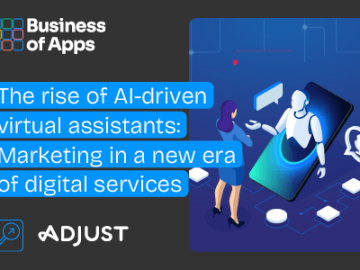By Viraj Sinh
The digital advertising landscape has been undergoing seismic shifts for a few years now, propelled by technological advancements, changing consumer behaviors, and a growing emphasis on data-driven decision-making. Mobile-based businesses have been leveraging different channels to discover, reach, and acquire potential customers in an enhanced privacy-first ecosystem. Amidst this, continued advancements in AI and machine learning have also left an impact on how marketers approach newer technologies for user acquisition. One of the most notable trends of this era is the synergy of privacy-focused marketing strategies to achieve full-funnel ROI impact.
The Privacy Conundrum and Contextual Advertising

Canva unveils ‘Dil Se, Design Tak’ brand campaign aiming for Indian market

Be original

Haier India joins Disney+ Hotstar as Wimbledon 2024 associate sponsor

New Relic rolls out AI-Driven Digital Experience Monitoring Solution
According to industry statistics, almost 98% of smartphone penetration is between the age group of 16-45. This group has a high acceptance of apps and technology in their daily life. Often, these segments of users are also aware of how their personal information is collected and not open to sharing their data, but they’re also willing to engage with ads if they are interested in a product or if the ad messaging is engaging. This has led to a sort of privacy conundrum.
Marketers must adapt to this new reality by embracing privacy-focused solutions as well understand the dynamics and integrate these strategies seamlessly with contextual advertising. By doing so, advertisers can navigate the complexities of the evolving privacy landscape while delivering meaningful, personalised experiences that resonate with users and foster long-term brand relationships.
Additionally, with more users limiting what data can be tracked, quality ad placements are likely to become challenging, making it harder to get high-LTV conversions. A lack of full-funnel transparency also limits app marketers from correctly identifying the causes of low retention rates and making appropriate optimisations to campaign settings.
The Fuel for Full-Funnel Success
Rather than relying on granular user data, contextual advertising focuses on the content surrounding the ad placement. By understanding the context in which an ad is presented, marketers can tailor messages that resonate with the user without relying on intrusive personal information. This approach not only respects user privacy but also enhances the relevance and effectiveness of advertising efforts while becoming a fuel for full-funnel success.
One of the ways marketers are leveraging privacy-first platforms without compromising on ROI is through Apple Search Ads and SKAN to discover and reach the users when their intent is high.
Because Apple Search Ads focus on user search intent or keyword-led marketing, it uniquely blends consumer preferences while ensuring the method is performance-oriented for higher ROAS. To mitigate low-quality conversions, ads are placed within the App Store where users come with the sole intent of downloading an app. By allowing advertisers to bid on specific keywords relevant to their app, Apple Search Ads aligns seamlessly with the principles of contextual advertising. This approach not only respects user privacy but also ensures that the ads are presented to users actively seeking relevant content, contributing to higher-quality conversions and enhanced retention rates. Marketers also are empowered to leverage different ad placements that can target a user throughout their app download funnel – from discovery to consideration and install. Marketers can leverage contextual signals such as keywords, topics, and page context to tailor messages that resonate, without compromising individual privacy. The creative content of the ads is optimised based on aggregate search query insights of the iOS users in the targeted region. By adopting a holistic approach that spans the entire customer journey, marketers can create cohesive and consistent experiences for users.
Taking a step further, integration of such platforms with MMPs will help to further optimize campaigns for higher ROAS, without the need for specific user data. This resolves the evergreen marketing puzzle of the lost ad spend. With privacy-first AdTech platforms, the campaign data is only available as an aggregate. But MMP insights make it possible to view the granular full-funnel performance of the ad campaigns – starting from impressions to in-app purchases/post-install bottom-funnel event conversions.
In the context of Apple Search Ads, it can help to understand which keywords, keyword match types, bid ranges, or Custom Product Pages are driving high pre-install and post-install metrics.
Navigating the Future of Privacy-Driven Advertising with Full-funnel Approach
As the advertising landscape continues to shape up, driven both by changes to the privacy paradigm as well as new emerging LLM models and GenAI, navigating the future amidst these changes will be key for marketers to reach their users throughout their journey.
Full-funnel approach can help them to recognise the complexity of consumer journeys in today’s interconnected world. The interplay of integrated technologies, data-driven insights, and a holistic understanding of the customer journey empowers marketers to create impactful campaigns that resonate with users at every stage.
Marketers must adapt to this new reality by embracing privacy-focused solutions, understanding the dynamics of contextual advertising, and integrating these strategies seamlessly into comprehensive full-funnel approaches.
Contextual advertising, driven by data integrity and user consent, has emerged as the linchpin for achieving enhanced conversions and retention rates. By having the right mix of channels and privacy-first platforms in their media mix, marketers can not only address the challenges posed by changing user attitudes towards data sharing but also lay the foundation for sustainable, user-centric advertising practices in the evolving digital ecosystem, and propel their marketing goals towards more ROAS-driven models.
Seeking advertising platforms and channels that not only respect user privacy but also ensure that the ads are presented to users actively seeking relevant content, can contribute significantly to higher-quality conversions and enhanced retention rates. As marketers navigate the privacy conundrum, the integration of Apple Search Ads into their strategies represents a compelling step forward in preserving user privacy while maintaining the effectiveness of targeted advertising through a full-funnel approach.
The author is Chief of Strategic Initiatives at Affle.
Follow us on Twitter, Instagram, LinkedIn, Facebook




